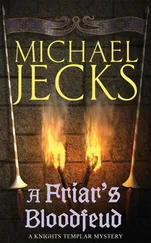Michael Jecks - City of Fiends
Здесь есть возможность читать онлайн «Michael Jecks - City of Fiends» весь текст электронной книги совершенно бесплатно (целиком полную версию без сокращений). В некоторых случаях можно слушать аудио, скачать через торрент в формате fb2 и присутствует краткое содержание. Год выпуска: 2012, ISBN: 2012, Издательство: Simon & Schuster UK, Жанр: Исторический детектив, на английском языке. Описание произведения, (предисловие) а так же отзывы посетителей доступны на портале библиотеки ЛибКат.
- Название:City of Fiends
- Автор:
- Издательство:Simon & Schuster UK
- Жанр:
- Год:2012
- ISBN:9780857205247
- Рейтинг книги:5 / 5. Голосов: 1
-
Избранное:Добавить в избранное
- Отзывы:
-
Ваша оценка:
- 100
- 1
- 2
- 3
- 4
- 5
City of Fiends: краткое содержание, описание и аннотация
Предлагаем к чтению аннотацию, описание, краткое содержание или предисловие (зависит от того, что написал сам автор книги «City of Fiends»). Если вы не нашли необходимую информацию о книге — напишите в комментариях, мы постараемся отыскать её.
City of Fiends — читать онлайн бесплатно полную книгу (весь текст) целиком
Ниже представлен текст книги, разбитый по страницам. Система сохранения места последней прочитанной страницы, позволяет с удобством читать онлайн бесплатно книгу «City of Fiends», без необходимости каждый раз заново искать на чём Вы остановились. Поставьте закладку, и сможете в любой момент перейти на страницу, на которой закончили чтение.
Интервал:
Закладка:
Michael Jecks
City of Fiends
PROLOGUE
Relationships are always changing. Sometimes their adjustments are so gradual, we hardly notice them; occasionally they are shattered by shocks that devastate all concerned, but whether they alter with glacial or lightning speed, the effect can be profound.
In a family, in a village, in a city, the connections that matter most are those with our nearest family and friends, yet they are the ones which are tested daily. These are the people whom we can most easily upset – and yet they are the very ones upon whom we most depend.
Disputes can occur at the drop of a hat: a misinterpreted expression, a careless word, a hand held too long – all can lead to sharp words, bitterness and rancour.
Reconciliation may be straightforward if attempted with speed, but it is less certain when allowed to fester. It is better, so they say, not to sleep on a quarrel. But all too often men and women lie weeping into the night over cruel words. Words which were uttered in the heat of the moment and which were never intended to have a lasting impact; or worse, words which were precisely considered – and all the more vicious as a result.
In the year 1327, all over the kingdom people went about their business in a state of constant worry because they feared what the future might bring.
Their King, Edward II, had been forced to abdicate.
The uncertain political situation affected everyone: the merchants and traders of Exeter, just as much as elsewhere in the realm. In such a climate, even mild-mannered people became uncharacteristically quick to take offence; disagreements abounded and could grow into outright feuds, petty disputes into fist-fights. Even murder.
In one street in Exeter that June, an argument that arose from an ill-considered reckless threat grew to dominate the lives of all about and escalated into a disaster that would overwhelm them all with hideous acts of violence. All for love, for loyalty, or for honour.
And none of those who were intimate with the victims or protagonists would be untouched by the consequences.
CHAPTER ONE
Feast of the Nativity of St John the Baptist, first year of the reign of King Edward III
Petreshayes Manor, Yarcombe, East Devon
The smoke could be seen clearly from half a mile away. In the still air of the summer’s evening, the columns rose from the manor’s fires like pillars supporting the sky.
‘Hold!’ commanded Sir Charles of Lancaster, peering ahead. There was no sign of alarm. A wood on their left offered some protection, while to the right there were some fields, pasture, common land. All ideal for pursuing their victims, should they escape.
‘Here we are, boys,’ he breathed.
His men stared. There was a heightened tension, the awareness of an imminent fight. Breath rasped, and he heard the soft hiss of a blade being drawn, the jangle of bit, the squeak of leather, the hollow clop of a hoof.
‘That’s the manor,’ his guide said. Wat Bakere was a rotund, smiling man, but he wore a scowl today. ‘You’ll find it easy to overrun. Kill them all.’ He was pointing at the church and manorial buildings over at the other side of the dirt road. It curled about the line of the manor, which was a prominent landmark.
‘You’re sure they are there?’
‘Ulric told you, didn’t he? He said they would be,’ Bakere said, jerking a thumb at the lad behind him.
Sir Charles nodded.
He was a tall man, fair and handsome as a Viking, and ruthless as a berserker. During the last civil war he had fought against the King for his lord, Thomas of Lancaster, and when Earl Lancaster was executed, Sir Charles had been exiled. That was five years ago, and when he begged for a pardon for his offences, his King had been gracious. He was rewarded with positions of trust, and given a living once more.
He asked for no more; he had given his word and his hand to his King, so when Edward II was captured by his enemies, Sir Charles became a recusant knight. He would not renege on the new oaths he had given his King. Instead he left the comfortable billet in the King’s manor at Eltham where he had lived for the last months, and rode into the twilight to take up arms on the King’s behalf.
Now the King’s son had taken the throne, Sir Charles was a renegade. A felon. Because he would hold to his vow.
Today, with his band of warriors committed to the King, he would begin the fight to return Sir Edward of Caernarfon, as he was now labelled, to his natural place on the throne of England.
Sir Charles looked at Ulric of Exeter. He was more trustworthy than Wat Bakere. Bakere had been given to him by Stephen Dunheved, a man who appreciated the value of good information, but it was Ulric, the merchant’s fellow, who had brought the details. Returning his gaze to Bakere, he nodded.
‘You were the baker at this manor?’
Bakere rolled his eyes impatiently. ‘Yes. I told you – I’d been here two years when I left a fortnight ago.’
‘But even then you heard that the Bishop and his entourage were to come here?’
‘Yes.’ Wat looked up at him, his eyes creased in sardonic amusement. ‘You don’t know what it’s like. They hear their lord’s coming to visit, and all hell is let loose! Rooms must be cleaned, beasts must be slaughtered, money must be counted and recounted, food stores checked so the master can see nothing’s been lost or stolen . . . there’s no peace for anyone. As soon as his visit was announced, the villeins were driven lunatic by the steward’s demands. So was I. I needed more flour for their food, and the steward was never willing to-’
‘What makes a man like you become disloyal to his master, I wonder?’
‘I owe them nothing !’
‘I see,’ Sir Charles said languidly. He suspected that Wat had been found with his hand in the food bin. Bakers were notorious for making undersized loaves, keeping back the excess flour to sell, or making their own loaves larger than those for others. A greedy little man, this Wat.
He turned his attention back to Ulric. The scrawny wretch was looking miserable. It was he who had brought confirmation that Bishop James Berkeley was heading this way, and now he knew the consequences of his report, he was regretting it. The lad was too young; he needed his spine stiffened.
Sir Charles studied the road ahead and soon made his dispositions. The men for the woods dismounted, the youngest boys taking the reins while the older men shifted their weapons on their belts, bound quivers to their hips or backs, laced their bracers, and strung their bows. There was little sound from any. All knew their part.
Those on foot were to work their way to the north of the manor and drive the terrified workers south, to where the horsemen could cut them to pieces. After that they would head for the manor itself. Easy prey, these, although it was best not to be complacent. Sir Charles had once been all but bested by a pathetic-looking chaplain who had displayed a ferocity in fighting that was more suited to a Teutonic Knight.
The men were disappearing into the trees already. When the last was gone, Sir Charles nodded to himself. He would wait until he saw the first signs of panic in the fields, then race down and destroy the peasants.
Wat’s eyes were fixed on the scene ahead. ‘They don’t realise what’s going to hit them,’ he said with glee.
‘Few ever do,’ Sir Charles smiled.
Wat was about to speak again when the knight’s fist caught him in the chest. He jerked with the slamming shock, then hunched to save himself being thrown over the cantle, and glared at Sir Charles.
‘What’s that for?’ he gasped, but even as he spoke, his eyes fell to the mailed fist at his breast.
Читать дальшеИнтервал:
Закладка:
Похожие книги на «City of Fiends»
Представляем Вашему вниманию похожие книги на «City of Fiends» списком для выбора. Мы отобрали схожую по названию и смыслу литературу в надежде предоставить читателям больше вариантов отыскать новые, интересные, ещё непрочитанные произведения.
Обсуждение, отзывы о книге «City of Fiends» и просто собственные мнения читателей. Оставьте ваши комментарии, напишите, что Вы думаете о произведении, его смысле или главных героях. Укажите что конкретно понравилось, а что нет, и почему Вы так считаете.












